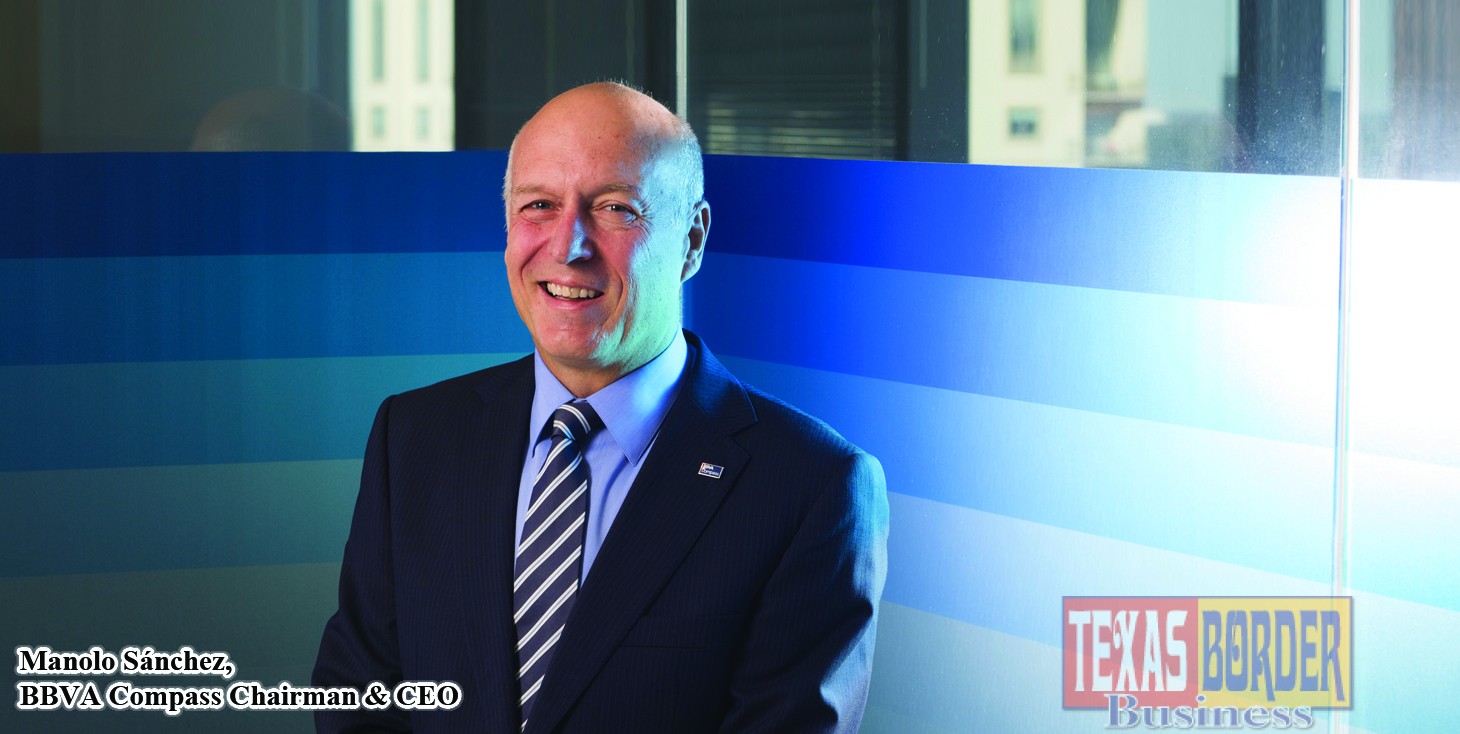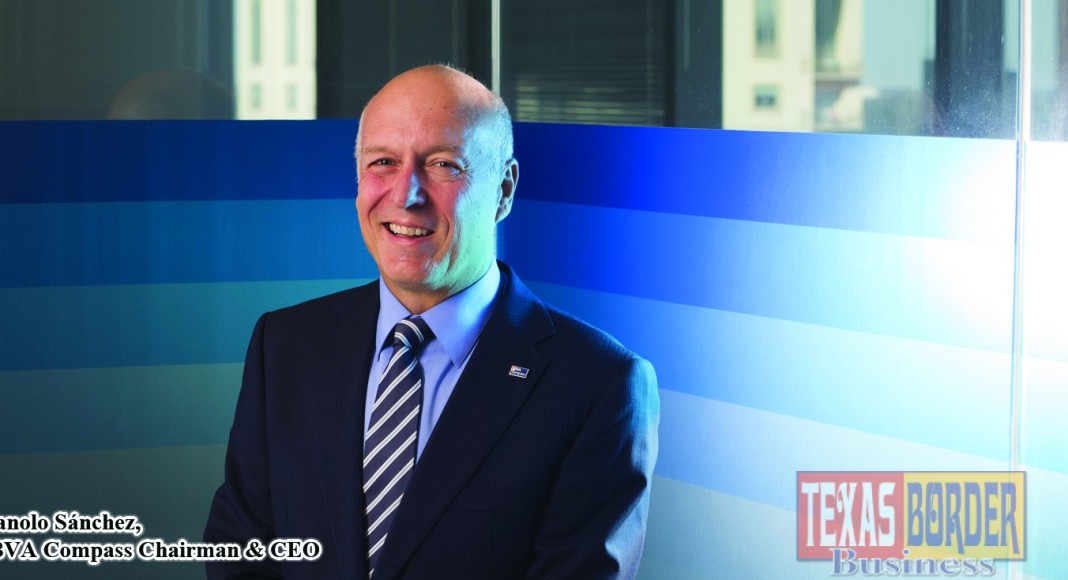
Texas Border Business –
By Roberto Hugo Gonzalez,
Manolo Sánchez, BBVA Compass Chairman & CEO, is a different banker that understands banking from different perspectives. He is a polyglot; he speaks five languages — Spanish, English, French, German and Arabic. Knowing several languages has given him the opportunity to do what only a few in the industry can do, understand domestic and global banking.
He is recognized as a top banker in the industry, and leads a unique team of professionals. That is why BBVA Compass ranks among the top 25 largest U.S. commercial banks based on deposit market.
Sánchez is based in Houston, Texas, and responsible for 673 branches in the U.S. There are 45 of those branches in the Rio Grande Valley. This includes the McAllen MSA, Brownsville MSA, Rio Grande City, and Raymondville. BBVA Compass also has branches in Laredo, Eagle Pass, and Del Rio, Texas.
Texas Border Business first met Sánchez when he came to the Valley to lead Laredo National Bank. At the time, he told Texas Border Business that the move from Mexico City to Laredo, Texas, had been a smooth transition for him personally and professionally, as well as for his wife, Daniela, who is from Mexico.
Sánchez’s career with BBVA started in Madrid. He then worked five years in Paris and three years in New York. He then spent three years in Mexico City with BBVA Bancomer, where he was Chief Risk Officer (CRO) and managed the credit portfolio of $20 billion.
He is originally from Murcia, in southeast Spain, and came to the U.S. for the first time as an exchange student in 1982. In 1985, he first visited South Padre Island during his spring break and got a taste of the uniqueness of South Texas. He was impressed by the influence of Mexico on the area and never thought or imagined that years later he was going to manage a very successful bank in the area.
Being familiar with the area, Sánchez knew that the Valley was the No. 1 place to develop. He said that the economy was growing with all the ingredients to master relationships with clients and businesses.
Today, Sánchez has succeeded in bringing the bank to another level. In its July 2014 issue, American Banker reported that BBVA Compass scored 78.9 on the magazine’s 100-point scale, with the Spanish-owned Southern regional edging out last year’s No. 1, Union Bank, for the top spot on its survey on the reputations of the top banks.
In that report, it was also mentioned that within the past year and a half, BBVA Compass has moved checking and savings accounts to a new technology platform that provides real-time processing and the full scope of each customer’s relationship with the bank.
Sánchez’s responsibilities are many, and one of the new fronts is millennials, the most educated, tech-savvy generation in the U.S. They represent a natural opportunity for the financial industry. He said that meeting their expectations will be a challenge for banks.
Millennials are starting adulthood in a more complex economic environment, writes BBVA Compass economist Marcial Nava. The 75 million U.S. consumers aged 18 to 34 are highly educated but burdened with student debt, limiting their access to other forms of credit. They’re also delaying marriage and aren’t pursuing mortgages, credit cards and other financial services as much.
Q: How is shale technology impacting the state of Texas?
A: Our team of economists is closely watching this. Shale technology has allowed Texas to boost oil production to historical highs. The shale industry demands high-skilled workers and provides higher incomes. This, in turn, helps support demand for other goods and services and lower-skilled occupations. Shale technology also has allowed the state to develop a strong base of highly competitive companies that will be able to expand their business operations abroad.
Q: And what impact do you foresee in Mexico with the Burgos shale?
A: Mexico needs capital and technology, and Texas firms stand ready with the resources required to develop the Burgos shale. But our economic research team notes that this will take time as Mexico begins the paramount task of adding infrastructure to develop new fields in the Burgos Basin as well as near-shore and off-shore.
Q: What is the economic outlook for Mexico and Texas, and what changes are expected for 2015?
A: Both regions have enormous potential. Our economists expect real GDP growth to expand above 4 percent in Texas and 3.5 percent in Mexico.
Q: What does the drop in oil prices mean for the economy?
A: Our economists say lower oil prices will be a net positive for U.S. growth as lower fuel prices boost households’ disposable income and reduce input costs for energy-intensive industries. However, there will be a negative effect on the oil and gas sector, which will undergo a sharp correction in investment and employment. For Texas, the drop in oil prices creates economic headwinds. Nonetheless, the impact will be smaller than in the 1980s due to greater economic diversification, increased trade openness, regional and national bank financing, and absence of a real estate bubble.
Q: What do you foresee for interest rates in 2015?
A: We believe interest rates will remain low for a prolonged period and climb slowly. Our economists maintain their expectations for the first rate hike in mid-2015, with long-term interest rates holding below 3 percent through most of 2015.
Q: How do you think the recent healthcare legislation is impacting businesses?
A: It is too early for a full assessment because many measures will take time to be fully implemented. However, as with many policies, our economic research team anticipates both positive and negative impacts. For example, we expect higher costs for small businesses but lower healthcare inflation and efficiency gains.
Q: What do you see for retail business in the next 12 months?
A: We expect 2015 to be the best year for retail businesses since the start of the crisis, thanks to higher real incomes, stronger household financial conditions, higher job growth, lower unemployment, and reduced number of underwater borrowers.
Q: What do you see for the real estate market for the next year? What do you see for auto sales?
A: Our economists believe the real estate market will continue on an upward trend as the excesses of the previous housing bubble shrink even more. In addition, low interest rates and higher incomes will allow more people to buy new cars, thereby boosting pent-up demand.
Q: What do you see for job growth and in what fields?
A: Job growth will continue to be above 200,000 per month on average, according to our research team. We expect strong gains in professional services, healthcare, leisure, construction, and retail trade.
Sánchez has a bachelor’s from Yale University, masters from the London School of Economics, and the College of Europe in Bruges, Belgium.
The Laredo Gateway Rotary recognized him as the 2014 Paul Harris Fellow on December 9, 2014, with an Honoree Reception and Gala Dinner at the Laredo Energy Arena. The dinner honored Sánchez for his contributions to the Laredo Community.
Sánchez also gives back to his community as a board member of the Houston Symphony and a trustee at the Post Oak Montessori School. He also is a member of the admissions committee of Yale University.
Written by Roberto Hugo Gonzalez, the 2009 SBA Journalist of the Year award winner and the 2009 and 2012 Paul Harris Fellow award recipient. TBB













